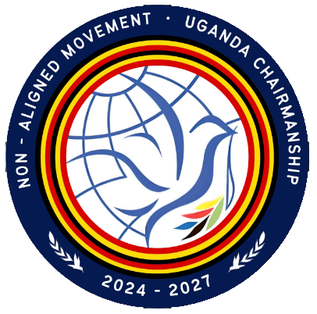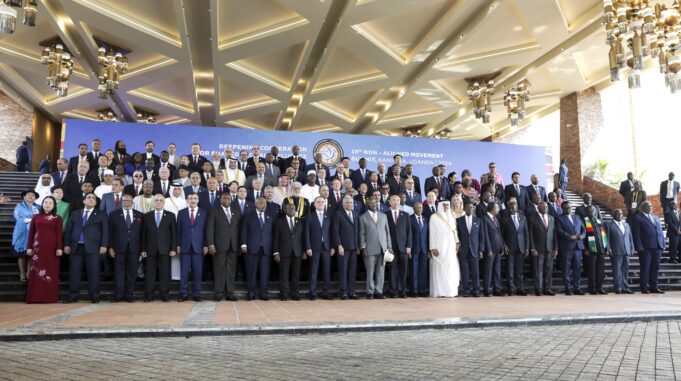The 19th Non-Aligned Movement (NAM) Summit kicked off recently in Kampala, Uganda, amid global challenges, including climate and environmental challenges and atrocities occurring in Sudan and occupied Palestine.

The five-day summit is the largest grouping of states worldwide after the United Nations, with 120 member states, 18 observer nations, and 10 organizations. The 19th NAM Summit was held in Kampala where President Yoweri Museveni officially assumed the chairmanship of the group for the next three years.
The gathering reserved special criticism for Israel for its military campaign in Gaza and called, in unison, for an unconditional ceasefire and an “end to the fighting that continues to take a toll on mostly civilian Palestinians.”
This ceasefire demanded by the NAM was presented by South Africa at the International Court of Justice (ICJ) but fell on deaf ears. On January 26, the ICJ president, Judge Joan E. Donahue, stopped short of calling for a ceasefire. What the World Court (another name for the ICJ) called for instead was a demand that Israel prevent going forward, acts of genocide in Gaza.
According to Judge Donahue, the court was ordering “provisional measures” because “the catastrophic humanitarian situation in the Gaza Strip is a serious risk of deteriorating before the court reaches its final judgment.”
Israel’s war on Gaza, which has increasingly included the West Bank continues to dominate world events and global forums and sparking mass rallies around the world. The war was the topic of focus at the World Economic Forum annual meeting in Davos, Switzerland, the UN Security Council, the UN General Assembly, the Arab-Islamic Summit in Saudi Arabia and the Arab League emergency meeting on Gaza.
There is also a growing case that was presented at the International Criminal Court (ICC), where Palestinians in Gaza are represented by Italian attorney Tiersisto Mariniello.
Mariniello has been highly critical of the ICC’s lack of commitment when it comes to Palestine.
He was quoted in a Jan. 18 article published by Anatolia Agency, a state-run news agency headquartered in Ankara, Turkey. “I don’t think anyone can deny what we can call the double standards when it comes to the way in which Palestine and Palestinian victims have been treated by the international community, compared to other situations,” he said, citing as an example the urgency shown by the ICC on the Ukraine war.

Scores of heads of state and senior officials that gathered at NAM, in the East African country, condemned Israel’s military action in Gaza, which dominated the closing sessions of the summit. Two of the top diplomats of the United Nations rallied the 120-member bloc to condemn what they called the indiscriminate attacks against Palestinian civilians.
According to UN Secretary-General Antonio Guterres, who spoke at the summit, “Human rights international law and the Geneva Convention and the UN Charter are being flouted with impunity, and conflicts are raging and proliferating from Sudan to Ukraine to Gaza following the abhorrent Hamas attacks on October 7. The whole destruction of Gaza and the number of civilian casualties caused by the Israeli army in such a short period (three months) are totally unprecedented during my mandate.”
The African Union (AU) chairman and former Chadian foreign minister, Musa Faki Mohammad, described the war in Gaza as immoral and unacceptable. He called for an immediate “end to the unjust war against the Palestinian people and an immediate implementation of the two-state solution. He pledged the AU’s full support for the Palestinian people.
The 19th summit of the Non-Aligned Movement member states ended the night of Jan. 20 by releasing the Kampala Declaration, slamming Israeli military aggression and calling for the implementation of the UN Security Council resolution to allow humanitarian aid into the besieged Gaza Strip.
The 47-article presented at NAM stated that the group “strongly condemns the illegal Israeli military aggression on the Gaza Strip, the indiscriminate attacks against Palestinian civilians, civilian objects, the forced displacement of the Palestinian population and further calls for an immediate and durable humanitarian ceasefire.”
During a press conference in The Hague, following the Jan. 26 ICJ ruling, South African Foreign Minister Naledi Pandor displayed some disappointment in the court not calling for a ceasefire: “What we’ve (South Africa) done, a clear signal has been sent … and what we’ve done is a test for the government and people of Israel, as to whether they will act in a manner that says all of us must respect international law.”
Should Israel not respect the ICJ decision, she added, “then essentially we’re opening up room for all abusers, in many conflicts throughout the world. And I think it would be setting a terrible, terrible precedent.” Follow
@JehronMuhammad on X, formerly Twitter













